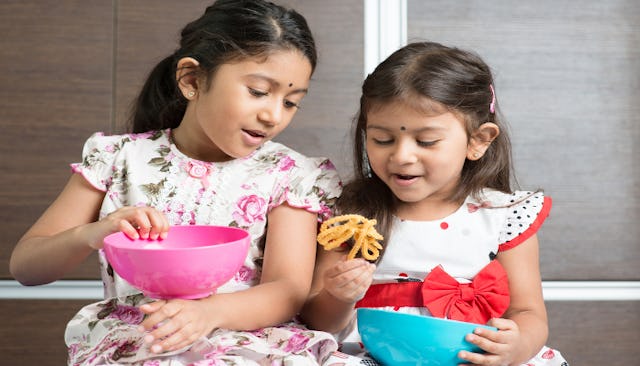Having A Second Kid Could Make Your First Kid Healthier

Research says your pesky younger sibling is partly responsible for your good health
Do you have a sibling? Whether you’re the exalted first, the nurtured baby, or the oft-maligned middle child, you probably have strong feelings about your birth position. And if you’re the oldest of however many, you’ve probably spent a lifetime at least occasionally grumbling about having paved the way for your little brother or sister. As it turns out, science says you should probably thank them for contributing positively to your health.
According to a U.S. study published by the American Academy of Pediatrics, a kid who gains a sibling by the time she or he reaches first grade is less likely to be obese. You may be pondering: is it because the eldest is being exhaustively pursued by annoying brothers? Maybe a family is simply sharing the same amount of food among more people? Or perhaps a parent with multiple children is more likely to surrender to the active sanctuary that is the local park at 10 am, 1 pm, and 4 pm daily?
The study doesn’t specify why the arrival of a sibling means a child is up to three times less likely to become obese, only that the stork’s delivery must take place before the first child is around 6 years old in order to be associated with a “healthier BMI trajectory.” Rest assured: there is no mention that an only child will be obese; the research just alludes that perhaps once a second kid arrives, there may be lifestyle or parenting changes that result in leaner kids. Like, say, no longer giving a shit when your kid refuses to finish the food on his plate because you’re so tired that you could fall asleep with your head cradled by buttered noodles as your progeny literally run circles around you.
There are SO MANY factors which could impact childhood obesity, so this study is just a compelling piece of a much larger puzzle. The last time I checked, one could use research to blame childhood obesity on practically everything: maternal health, pregnancy weight gain, ancestral history, fake sugar products, real sugar products, a father’s affection, deli meats, C-section births, breastfeeding a toddler in public, not breastfeeding at all, screen time on a variety of devices, and probably Caillou.
This study, though impactful, likely won’t motivate anyone who’s been on the fence to have another kid. It’s hardly romantic to huskily suggest that your partner join you for a romp because having a second child may mean your first is slightly less likely to be considered overweight by medical professionals. Rather, if you’re in the fortunate position to elect whether you have another kid, it’s a layered decision, like a Costco cake (yum). One might consider finances, employment, assistance, schooling, housing or more. You’re hardly thinking you should have another baby – within a few quick years no less – to increase the likelihood that your first, perfectly wonderful kid will have a lower BMI.
It goes without saying that having multiple kids who theoretically spend all this time running and playing and avoiding the boob tube doesn’t necessarily mean that the parents are healthier by proxy. If you want to survive the parenting gig by systematically testing out which magnum wine pairs best with crunchy peanut butter, you’ve got my support. Now that’s a great study to throw some weight behind – regardless of the results.